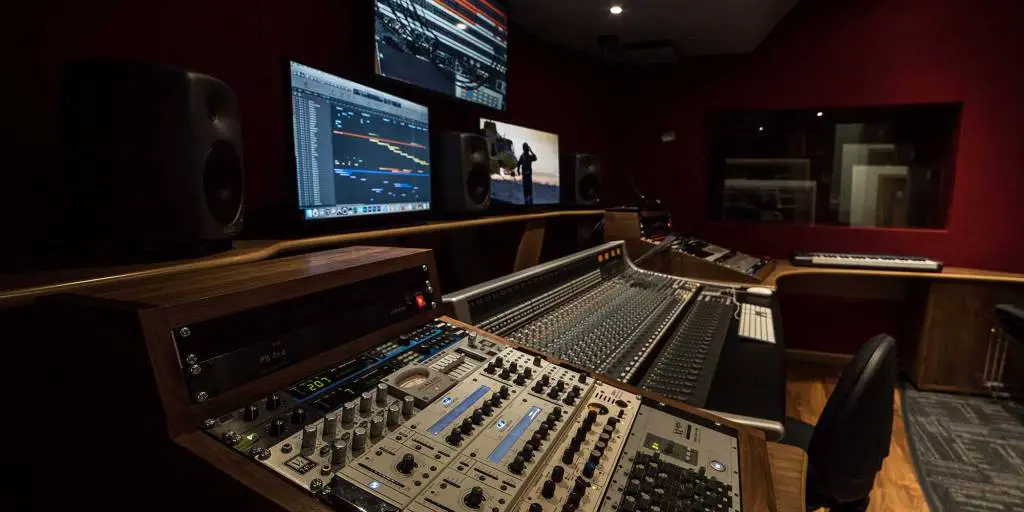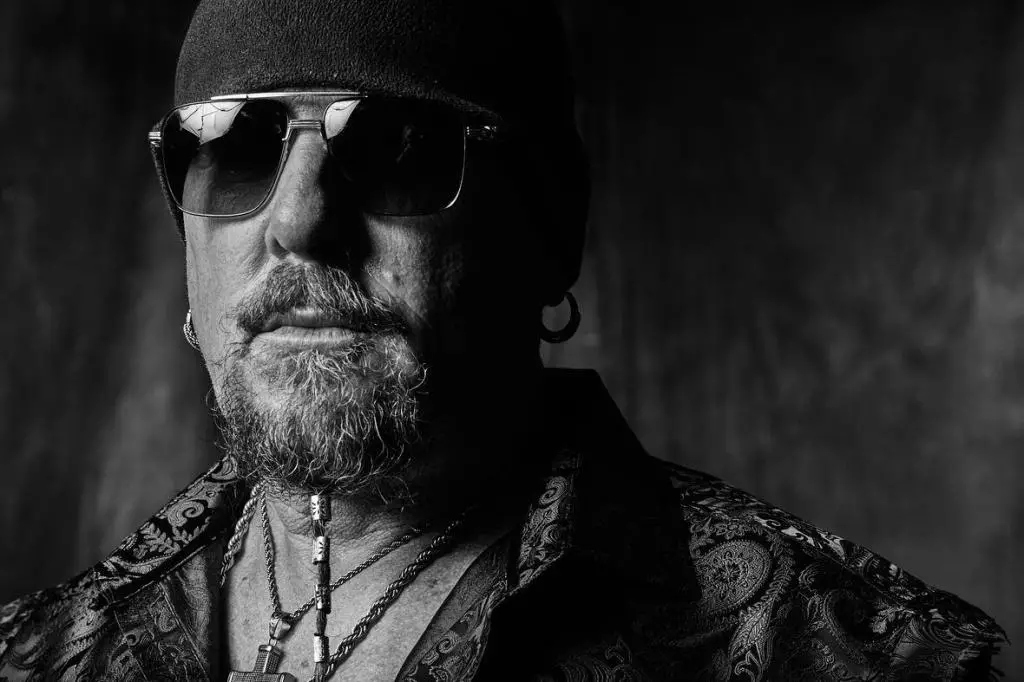All images courtesy of New Ocean Media
In the latter half of the 70s, many profound shifts were taking place in music. One of the oft-talked-about movements was the Heavy Metal bands that began to play music faster, heavier, rawer, and more aggressive. What began as a largely ignored and underground movement, soon transformed as it gained international recognition.
A significant concentration of those bands, historically, were located in the UK.
Today, these artists are referred to as The New Wave of British Heavy Metal (NWOBHM). The influence that NWOBHM artists have had is undeniable, spurning countless sub-genres of Metal and Hard Rock.
At the forefront of the NWOBHM was the mighty Saxon.
Saxon is one of the hardest-working bands in the genre, never going more than three years without an album. Not only has the band been prolific, but they are currently making some of the strongest music of their career. Their newest offering, Carpe Diem, is no exception. Behind all things Saxon, is founding member, and electric frontman, Biff Byford.
In this interview, Biff discusses with us the various sonic variations over the band’s career, inspirations behind Saxon’s classic songs, and why you need to be listening to Carpe Diem immediately.
If you’d like to learn more about Saxon, and their new album, Carpe Diem, head over to the band’s website and grab your copy today. You can also read VWMusic’s review of the album here.
Joe:
Let’s start by talking about the new album, Carpe Diem. During the writing and recording process, you spent some considerable time in the hospital. Shortly thereafter, COVID-19 hit, further increasing the time over which you spent completing the album. We were wondering how those experiences informed the album’s direction and process?
Biff:
Well, the writing process was a bit of a struggle. There were a lot of never surrender moments. I did have a bit of a health problem, back in September 2019. It was a bit crazy for a while because of that. We started writing the album back in 2019. Luckily, we were able to rehearse all the songs live back in that time. Nigel did the drums in February 2020. The COVID thing came along and squeezed it down a bit. We were ready to record, and release the album towards the end of 2020. It’s been delayed twice now. I think that adversity, and struggling against the odds made the album better somehow.
Joe:
How would you compare Carpe Diem, sonically, to your previous couple of albums [Thunderbolt and Battering Ram]?
Biff:
I think the songwriting is a bit more in your face on this album. The guitar riffs are heavier. I wanted to make the guitars more important on this album. I was looking to go back to the early days when the guitar riff was the first thing we heard on the song. I wanted to bring that back a little bit. Get some energy and some aggression in the playing. The writing of the songs all started, more or less, from a guitar riff. I wanted the boys to give me some guitar riffs, and I picked the ones that spoke to me. Then, I was able to take those songs further and arrange them. Write the choruses and rehearse them a bit. The writing process was slightly different on this album. I think that gives it a different sound.
Joe:
Let’s go back in time a bit. Walk me through how Saxon got their start?
Biff:
We got together around ’77. The band that turned into Saxon was, at the time, called “Son Of A Bitch.” We had a different drummer originally, and it wasn’t until ’78 that we started writing music together. Started sending off demo tapes and things. We finally got a hit and were offered a deal. The deal was contingent on us changing our name. So, we were racking our brains to come up with a different name. We couldn’t think of anything and signed the deal anyway. Somebody came up with the idea of calling us “Anglo-Saxon.” We didn’t like the “Anglo” bit but we liked the “Saxon” bit. It ended up sticking. In 1979, our first album came out. That album did okay, but not fantastic. Then the second album, Wheels Of Steel, came out in 1980. That’s the album that blew the lid off everything.
Joe:
You mentioned the first album. What caused the noticeable difference heard on that first album, from the few that followed it?
Biff:
I think some of the songs were written by Paul [Quinn] and me. Paul is one of our guitarists. He [Paul Quinn] was in the band with me even before we were Son Of A Bitch. Two of the other guys in the band, Steve [Dawson] and Graham [Oliver], had a few songs. All of us wrote a few songs together as a band. It was a mixture of different music styles. The first album sounds awesome. The actual sounds on the album are great. It’s become a really popular album as time has gone on. There are some great tracks on there. It wasn’t until all of us started writing together, for Wheels Of Steel, that the real Saxon sound came together. The band had real chemistry together at that time.
Joe:
What was it like coming up in that scene of historic British Heavy Metal?
Biff:
There were a lot of new bands around. There was Saxon. There was [Iron] Maiden. Bands like Tygers Of Pan Tang and Diamondhead. Girlschool was around at that time. There were quite a lot of new bands with first or second albums coming out. I think Def Leppard had an EP come out around that time. Their self-made EP. A lot was happening in the beginning. In late ’79 to 1980, we went out on our first tour with Motörhead. Motörhead was pretty big at that time, in the UK. After that, we went on our first European tour with Judas Priest. It was a great time for new music. We were considered to be a fairly new style of Heavy Rock. What later started to be called “Heavy Metal.”
Joe:
We started discussing Wheels Of Steel earlier. Let’s talk about that album and Strong Arm Of The Law. Both of those albums are considered classics in the Saxon discography, and in the New Wave of British Heavy Metal. Both albums came out in the same year and were significant in putting the band on the map. Given all of that, we imagine the albums often get compared to each other. How do you look back on those two albums?
Biff:
I think we were really prolific during that period. We couldn’t wait to write and release records. We couldn’t wait to tour. Looking back, I think we were a little quick with the release of those three albums. That trilogy, you know, the big three albums of that time. Wheels Of Steel, Strong Arm Of The Law, and Denim And Leather were groundbreaking albums for their time. I think so many people like all three albums. I don’t think people really have a favorite. People can’t decide which is the best between Wheels Of Steel or Strong Arm Of The Law. I think they are both great albums that were important to the band.
Joe:
As we understand it, there is an interesting story behind the lyrics of “Strong Arm Of The Law.” Can you talk a little about that?
Biff:
We were traveling home from London. I think we did a gig in the East End or somewhere like that. The police stopped us, thinking that we were a bunch of long-haired hippies. I guess we kind of were. [Laughs]. They were trying to convince us that they found some drugs in the car. We didn’t take drugs, at least not the kind of drugs that they were saying we took. The police planted a little tablet in one of the seats. They said they had found it in the car. They searched us and then let us go. We didn’t crack under the pressure. They tried to use the good cop, bad cop routine on us. It didn’t work. That’s what the song is about, “Stop, get out. We are the Strong Arm of the Law.”
Joe:
The last album of the “trilogy,” as you put it, was Denim and Leather. While it is hard to pick, this is the favorite album for so many fans. Why do you think so many fans hold this record with so much reverence?
Biff:
I think a lot of fans loved Denim and Leather because it’s about the fans. The title track is one of the first songs in the genre, as far as I know, that was written about the fans. We actually got some of the audience in the studio to sing on it with us. It’s a song about that time, “Denim and Leather brought us all together.” I’m singing about our audience, and that was unique for the time.
Joe:
You mentioned having the fans sing on “Denim And Leather.” How was that executed?
Biff:
We got the audience, by telephone and mail. There was no internet then. There was a fan magazine, and we put a little advert in the magazine. The advert said to come to the studio on such a date, and they did.
Joe:
Another unique thing about that track [“Denim and Leather”] was that it was the last song on the album. What went into that decision?
Biff:
I think the fact that it was a long track had something to do with it. Plus, why do things the same as everybody else? I think putting the title track last is cool. It’s a bit out there, so it suited our mentality. I think it closed the album nicely. It captured the spirit of the album and the band.
Joe:
In 1985, the band switched labels and came out with Innocence Is No Excuse. It was a significant change stylistically. What was the impetus for the sonic shift of the album, and how did you feel about it?
Biff:
It was a new record company and production team. Personally, as far as writing melodies and lyrics, I was pretty much doing the same thing I’d always done. I think the guitars weren’t as hard. The guitar riffs weren’t as natural as before. It wasn’t as in your face. The guitar sound wasn’t as heavy. I think we were just produced differently. A different sound, but in essence, it was still Saxon. I don’t think we changed in the songwriting department. I think the sounds changed and that colored the way people perceived the album. I think if we did a song like “Back On The Streets” today, it would be super heavy. So, I didn’t dislike the album. I just thought it was different than the stuff we had done previously. It wasn’t as raw. There was more of a complexity to it. I think that came from the production team and management team.
Joe:
As far as we know, Rock The Nations is the only album where you are credited with playing an instrument in the studio. Are there any other Saxon records where you play an instrument, perhaps uncredited? Was the recording or writing process any different for you on the album, given that you were playing bass?
Biff:
That’s the only Saxon album where I play an instrument. I did play on the album I did with my son earlier this year. That project is called Heavy Water. The process was pretty much the same. The thing is, I wrote a lot of songs playing bass. I used to play bass in the rehearsal room a lot. Just because you’re a singer doesn’t mean you don’t write guitar or keyboard riffs. The whole band can play different instruments. None of us are pigeon-holed into a particular area. They’re all superb musicians. We didn’t have a bass player, so I had to play.
Joe:
Unleash the Beast was the start of another major transformation, sound-wise, in Saxon’s history. The transformation led to some of the heaviest music in your catalog. How do you account for this change?
Biff:
We definitely became a bit darker when Doug [Scarratt] joined. Doug enabled us to experiment with the “black notes,” if you know what I mean. We love the period that started with Unleash The Beast. It took us back to being a heavy band again. I think, for a number of years before that, we were a little bit lightweight. I wanted to get back to being heavy again. I also took over the management of the band at that point. I think we became a lot more focused on what we wanted to be. We wanted to be a heavy band.
Joe:
The current lineup has more or less been together since Unleash The Beast came out in 1997. The string of albums you have put out since then has been really strong. What is it about this lineup that’s jelled?
Biff:
We found a really great formula. The band developed a certain chemistry with the addition of Doug and Nibbs [Carter]. We were able to write songs that meant something to us. Songs the fans thought were credible as well. I think that made a big change for us. We just write well together. Nobody’s got too much of an ego. We’re all in a big family, and we all do our job. If one guy writes three songs, and the other guy doesn’t write any, there’s no real jealousy there. That’s just how it is, you know? We’re able to create music in a fantastic environment. Everyone is writing continuously. It’s hard to write albums that are relevant when you’ve been around as long as we have. You have to keep on it. You must keep on it and think, “Is this great? Is this good? Would I get a record deal if I brought this out tomorrow?” That sort of thing is what drives me to write fresh music.
Joe:
Since Saxon’s inception in ’79, the band has never gone more than two or three years without recording an album. How have you been able to keep up with that torrid cycle of recording, and touring over all these years?
Biff:
I think it’s totally me. [Laughs]. I’m a bit of a lunatic when it comes to wanting things to start things earlier. Whenever we’ve finished a long tour, I like to start writing the next album immediately. When we finished a tour with Judas Priest a few years ago, I spoke with the band about starting the next album later that month. They were all like, “You must be mad.” I said, “If we don’t start writing now, we might not have anything for at least three years. So, let’s just start sending out some ideas.” That is what we did, and it’s where Carpe Diem came from.
Joe:
You’ve been on so many different tours, especially considering your live schedule over the years. What was your favorite band or bands to share the stage with?
Biff:
We toured with some fantastic bands. I don’t think we toured with a band that I didn’t like. The 80s were a strange time as far as touring partners for us. We went out with some bands that you wouldn’t think were right for Saxon. Our first American tour was with Rush, which was fantastic. I mean, we’re huge Rush fans. I think it was on the Moving Pictures tour. However, the crowd wasn’t really what you’d call a “Metal audience.” The Rush crowd was, understandably, more of a “Prog crowd.”
We went out with Rainbow, which was pretty good. It was a Rainbow that was a bit poppier than the Rainbow with Ronnie James Dio. Because of that, the crowds weren’t quite the same as the ones from some of the gigs we did with Black Sabbath. Then we went out with Cheap Trick. At the time, I had only ever heard one song of Cheap Trick’s [sings “Surrender”]. That was certainly a bizarre tour for us. But Cheap Trick is a great band and even greater guys. I liked touring with them. Again, not the right audience for us.
I would have liked to have been out with Judas Priest, or Scorpions, or somebody like that. But I don’t think our agent was their agent. So, we went out with the guys that were with our agent. I think that’s how it works in America most of the time. It wasn’t really until we went out together with our mates Iron Maiden in ’84 that we did a big coast-to-coast tour. That was on the Power And The Glory album. I really liked all the bands we toured with, but I think my favorite shows were probably with Maiden. That was the right audience. It was a fantastic time in 1984. That was the tour that broke Maiden, massively. We were in the charts at that time as well. It was a great time for both bands.
Joe:
I noticed you were offering the new album on cassette. Interestingly, cassettes have started to become popular again. It seems to have become particularly popular with Punk and Metal bands. We were wondering what you thought about this phenomenon and your opinion on cassettes as a medium?
Biff:
We’ve been doing cassettes releases for the last four or five albums. We were probably one of the first bands to start doing again. I think if you’re going to do the vinyl and CDs, you might as well do the cassettes. Everyone was surprised when we first started doing cassettes again but now, they’re cool. People like to collect them. They still have the cassette players, and you can still buy them. There is something different about them, you know. It’s almost like having a multitrack tape player in your car or your living room. It’s a different quality of sound whereas a CD or a record is different in their own ways.
Cassettes are very analog. A piece of tape traveling across a magnetic head. It goes way back to the 60s and 70s. I like the cassette. I think the artwork looks pretty cool on a cassette. In fact, I’ve got some cassettes of Saxon from the 80s. I’ve got the original Wheels Of Steel and Strong Arm Of The Law cassettes. I think I might have some 8-tracks of Saxon albums as well. We used to pick them up in America. You could slide them right into a player in your car and listen. We had an old Lincoln Town Car, and that had an 8-track in it. We used to use that all the time. That car is what “Wheels of Steel” is about.
Joe:
You are a founding member of Saxon and have been with the band since its inception. When it’s all said and done, what do you want the legacy of Saxon to be?
Biff:
The legacy of Saxon is that we’re one of the bands that started a new wave of Metal. A style of music that traveled around the world. We’ve now made twenty-four studio albums, and in my opinion, those albums have produced some great music. That’s the legacy of Saxon. The fact that we helped start a movement that went around the planet, and we’re still around. That’s our legacy.
Interested in learning more about the work of Saxon and their new album, Carpe Diem? Check out the link below:
Dig this interview? Check out the full archives of Records, Roots & Ramblings, by Joe O’Brien, here: https://vinylwritermusic.wordpress.com/records-roots-ramblings-archives/





Leave a Reply